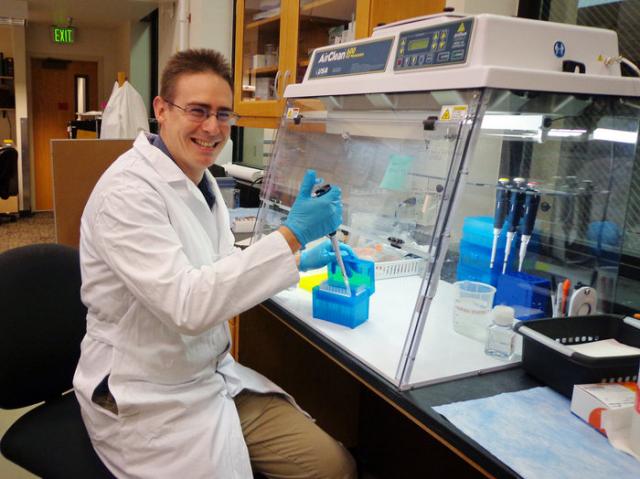
 A leading expert on microbiomes and bioinformatics, Rob Knight will be devoting some of his time to doing collaborative research in the Computer Science and Engineering (CSE) department at the University of California, San Diego’s Jacobs School of Engineering. The department confirmed Knight’s joint appointment in CSE as a Faculty Affiliate, following the Jan. 5 announcement from the UC San Diego School of Medicine that Knight has joined that school’s faculty as a professor in the Department of Pediatrics. The CSE appointment was effective Jan. 1, 2015. [Photo at right courtesy Casey Cass, University of Colorado]
A leading expert on microbiomes and bioinformatics, Rob Knight will be devoting some of his time to doing collaborative research in the Computer Science and Engineering (CSE) department at the University of California, San Diego’s Jacobs School of Engineering. The department confirmed Knight’s joint appointment in CSE as a Faculty Affiliate, following the Jan. 5 announcement from the UC San Diego School of Medicine that Knight has joined that school’s faculty as a professor in the Department of Pediatrics. The CSE appointment was effective Jan. 1, 2015. [Photo at right courtesy Casey Cass, University of Colorado]
In making that announcement, Dr. David Brenner, Vice Chancellor, UC San Diego Health Sciences and Dean of the School of Medicine, cited Knight’s “pioneering work at the University of Colorado at Boulder [which] helped reveal the astonishing diversity of microbes living in and on us.”
Knight is widely renowned for his early and innovative investigations of the symbiotic relationships between microbial life and humans. He has been a Howard Hughes Medical Institute Early Career Scientist, a TED speaker and co-founder of the American Gut Project, an ambitious effort to sequence the microbial population of the human gut using crowd-sourced samples and data.
In Pediatrics, Knight and his lab will continue to investigate how the human microbiome develops and how microbial variation impacts an individual’s health and susceptibility to disease. To do so, Knight aims to sequence the mass of genes from microbial communities and develop new computational tools to count and compare species. He is also a member of the Steering Committee of the Earth Microbiome Project.
“Rob Knight is a welcome addition to our faculty as CSE builds upon its existing strengths in bioinformatics, computational and systems biology,” said CSE chair Rajesh Gupta. “Going forward, we see professor Knight working in close collaboration with faculty advancing the presence of bioinformatics at UC San Diego, including professors Pavel Pevzner, Vineet Bafna, Nuno Bandeira, and Larry Smarr.”
“Working with excellent CSE faculty was a major draw in deciding to choose UC San Diego over other institutions,” said Knight. “Pavel Pevzner’s book on ‘Computational Molecular Biology’ was a huge influence on me in graduate school, and we plan to adapt our tools to interface with Nuno Bandeira’s computational tools.”
 CSE’s Smarr, who also directs the California Institute for Telecommunications and Information Technology (Calit2), notes that Knight is bringing with him a group of more than two-dozen students and researchers. Given that his own work in quantitative health has moved increasingly into the study of microbiomes, Smarr says that he plans to unify his microbiome work with Knight’s much large microbiome team.
CSE’s Smarr, who also directs the California Institute for Telecommunications and Information Technology (Calit2), notes that Knight is bringing with him a group of more than two-dozen students and researchers. Given that his own work in quantitative health has moved increasingly into the study of microbiomes, Smarr says that he plans to unify his microbiome work with Knight’s much large microbiome team.
“Calit2's Qualcomm Institute looks forward to collaborating closely with Rob Knight's group,” said Smarr. “The cyberinfrastructure for Big Data that Calit2, CSE and the San Diego Supercomputer Center have been pioneering will find a strong application driver in Rob's frontier microbiome research.”
“UC San Diego’s new microbiome initiative provides a unique combination of tools to read out the microbiome and analyze the resulting data, including DNA-based analysis and metabolomics, germ-free mouse facilities, high-throughput culturing, oligosaccharide profiling, immunological profiling and high-performance computing,” said Knight. “So the prospects for advancing the field as a whole, and for making truly significant progress on connecting the microbiome to human and planetary health at UC San Diego, are immense.”
Knight has previously used these technologies in distributed collaborations, especially those examining the role of the microbiome in obesity, malnutrition and inflammatory bowel disease. Now, having all such facilities located in one place, together with the ability to collaborate closely with local companies such as Illumina and MO BIO Laboratories, and to work with algorithm, database and systems experts in CSE, will dramatically accelerate microbiome research.
Knight, who earned his doctorate in ecology and evolutionary biology at Princeton University, is self-taught in computational biology, and he uses bioinformatics algorithms to develop phylogenic trees of myriad and previously unknown bacteria, grouping them into communities according to the evolutionary descent of the microbes they contain. He has proved to be a prolific and highly collaborative investigator across multiple disciplines. Knight has published papers discussing prairie soil and ocean water, toothbrushes, frog skin and the various roles of viruses, bacteria, fungi, other microbial eukaryotes and archaea, a domain of single-celled microorganisms. He is particularly noted for exploiting DNA sequencing technologies to differentiate unknown microbes based upon a single gene known as 16S ribosomal RNA. However, adds Knight, new collaborations to extend this work to functional profiling of genes, gene expression, and metabolites both “provide a range of interesting algorithmic and data management challenges, including many projects in which students can get involved directly now, and will provide fundamental new insights with practical applications into the microbial sides of ourselves.”
Related Link

